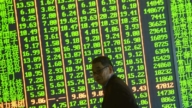【新唐人2014年04月07日讯】今年以来,因人民币贬值,打回之前的汇率原形,中国大陆的房价、出口、和生产指数持续下降,美元出逃,地方债务高筑,外界认为种种迹象,打破了中国经济增长的神话,中国经济正在朝着经济学家们预言的硬着陆奔跑。三大跨国投资银行形容,中国将可能成为新兴市场金融动荡的风暴中心。
最近,美国花旗集团、日本野村集团、瑞士信贷集团等跨国投资银行,纷纷发出警告说,人民币贬值可能会导致流入中国的热钱突然转向。
今年一季度,人民币汇率创下历年最高的2.6%的季度贬幅,将去年一年以来的涨幅几乎打回原形。《新华社》承认,人民币贬值已经导致热钱撤离。报导说,海外投资人“看空”中国经济的市场氛围有所上升,加上人民币改变单边升值趋势,导致部分投资者撤离与中国相关的投资。
热钱,又称游资或投机性短期资本。热钱的投资对像主要是外汇、股票、基金及衍生产品市场等,具有投机性强、流动性快、隐蔽性强等特征。
《新华社》的这篇报导说,使用离岸人民币在中国内地进行投资的基金公司,管理的资产规模,3月份萎缩的幅度创下了9个月来之最。这些基金公司其中最大的14家,管理的资产,在3月份减少了53亿元人民币,是去年6月份“钱荒”以来资产萎缩最多的一个月。
外界对人民币贬值的原因持有不同的看法,有经济学家认为,是中国经济在衰退,出口萎缩,人民币“无可奈何花落去”,也有一种看法认为,是中共央行故意让人民币贬值,企图使中国的出口重新恢复竞争力。
美国多元投资创办人周威宇:“原来很多资金进去,认为人民币绝对不会贬值,所以很多资金进去希望有一个套利的机会,人民币开始贬值后,有一些产品就相对变得有一些压力,所以人民币贬值,对中国市场是一个两面刃,虽然有助于出口,可是贬值过度也会引起资金外逃。”
1997年亚洲金融风暴之前,东南亚也是货币持续升值,后来出口衰退,货币贬值引发资金外逃。据中共海关统计显示,2月份,中国出口下降20.4%,贸易逆差为1,397亿9000万元,去年同期贸易顺差为934亿3000万元。
另外,根据“汇丰”银行公布的数据,中国采购经理人指数PMI,连续三个月来处于50以下,而且持续下降,说明中国经济出现放缓状态。
金融专家周威宇认为,中国现在经济衰竭的原因,是2008年全球金融风暴时,大量印制人民币救市造成的后遗症。
中国金融专家周威宇:“本来可能应该裁员,工厂倒闭,那时多发行人民币,然后让它房地产多烧了两三年,到现在它慢慢出现这个问题,所以我觉得是2008年后金融风暴的后遗症,不一定完全是美联储退场造成的状态。”
“花旗集团”在最新发布的报告中指出,可能会发生“以中国为震源地的第二次紧缩恐慌”,“花旗”建议客户,准备面临第2波的“缩减恐慌”。
中国金融智库研究员巩胜利:“外流,货币紧张的情况可能还要延续一段时间,最严峻的时候可能是8月,因为10月份美国的宽松货币要全部退出。”
大陆经济学者郑先生:“历史的发展规律不以个人或团体的意志为左右,我们目前金融体系最大的问题是,不公平而且也没有公开,肯定也不公正,当一个地方发展空间越来越狭隘的时候,越来越受限制的时候,而且受到歧视和打压的时候,他们当然知道趋吉避凶。”
《新浪财经》网站去年7月从各个角度分析,可能有超过万亿外资撤离中国。
河北天津市“南开大学国经所”客座教授刘杉撰文指出,热钱流出中国,不仅会刺破中国的经济泡沫,影响人民币国际化进程,还会刺激中国居民挤兑美元,进一步造成人民币贬值,使自己资产美元化。而泡沫破裂和资产美元化的结果就是货币通缩。
Hot Money Races out of China
This year, Renminbi (RMB) has dropped so badly that domestic
housing, export, and production index have declined.
Consequently, the dollars go out and local debts go up.
The phenomenon is believed to be breaking the myth of the
economic growth in China.
China’s economy is taking a battering as expected
by the economists.
Three multinational banks have warned recently, China is
likely to be the storm at the center of the emerging market.
Recently, U.S. Citigroup, Japan’s Nomura Group, and
Credit Suisse Group,
have respectively warned that RMB devaluation, may have
a reverse affect upon hot money (the flow of funds).
This year, the RMB exchange rate has hit the record low,
at a 2.6 percent decrease in a quarter.
The Communist mouthpiece Xinhua News Agency reported,
RMB devaluation has led to the withdrawal of hot money.
It is said that some foreign investors are leaving China as they
did not believe their would be a rebound within
the Chinese market,
and also due to the unilateral depreciation of RMB.
In financial markets, hot money is also known as refugee capital,
or speculative capital.
Hot money investments are mainly in foreign exchange, equities,
and funds. They can move very quickly in and out of markets.
Xinhua reported, offshore yuan investment in mainland China
has dropped in most of March in the past nine months.
Of the 14 major companies assessed, there was a reduction of
5.3 billion yuan (US$ 850 million) in March,
the sharpest decline since money shortage in last June.
Economists hold different views about the RMB devaluation.
Some believe that the Chinese economy is in recession, with
weakening in exports and yuan.
Others believe, central bank deliberately weakened yuan
to restore the export competition.
Rex Zhou, New Assets Investment Advisors founder: “A lot of
money went in to the system,
believing in the strength of the yuan, hoping to earn
quick interests.
After the devaluation of yuan, pressure starts to mount
upon some of the products.
The devaluation of yuan has become a double-edged sword.
It helps the exports, but also causes capital outflow."
Prior to the 1997 Asian financial crisis, Southeast Asia also
experienced continued depreciation of the currency,
followed by weakening exports and currency devaluation,
and subsequently led to capital outflow.
According to Communist China Customs statistics, China’s
exports fell 20.4 percent in February,
a trade deficit of 139.79 billion yuan, compared with a surplus
of 93.43 billion yuan from last year.
In addition, HSBC Bank of China, showed China’s purchasing
managers index PMI,
had declined to below 50 for three consecutive
months and continued to remain low,
indicating a slowing down in China’s economy.
Financial expert Rex Zhou believes that economic
failure in China,
is most likely due to mass printing of RMB during
the global financial crisis in 2008.
Rex Zhou: “The supposed layoffs and factory closures were
saved by the mass printing of RMB,
lasting for a good couple of years.
But now the problems are surfacing.
I believe it is more of an issue caused by the monetary policy
during the 2008 financial crisis,
not necessarily due to the withdrawal of the Fed’s reserve."
Citigroup’s latest report, told clients to brace themselves for
a second phase of the “taper tantrum",
which rocked emerging markets last year, this time,
with China at the eye of the storm.
Gong Shengli, Chinese financial think tank researcher:
“The capital outflows and stressful currency situations, may
have to continue for some time.
It may be the toughest in August as it is getting close to the
complete withdrawal of Fed’s monetary policy,
quantitative easing (QE), in October."
Mr. Cheng, anonymous Chinese economist: “History does not
develop according to the will of an individual or a group.
The biggest problems in China’s financial system, are that it is not
fair and it is not open.
When the development is getting more narrow and restricted by
discrimination and suppression, it is only wise to escape."
The Chinese Sina Finance Website analyzed last July, that more
than one trillion yuan (US$160 billion) of foreign investment,
might have withdrawn from China.
Visiting Professor for Institute of International Economics,
Nankai University, Liu Shan,
argued that hot money outflow will break China’s economic
bubble economy,
affect the process of RMB internationalization, and push the
Chinese run on the dollar,
causing further devaluation of yuan and dollarization
of Chinese assets.
The consequence of the bubble bursting and the dollarization of Chinese
assets, is the deflation of currency.
Interview & Edit/Liuhui Post-Production/Shucan



























